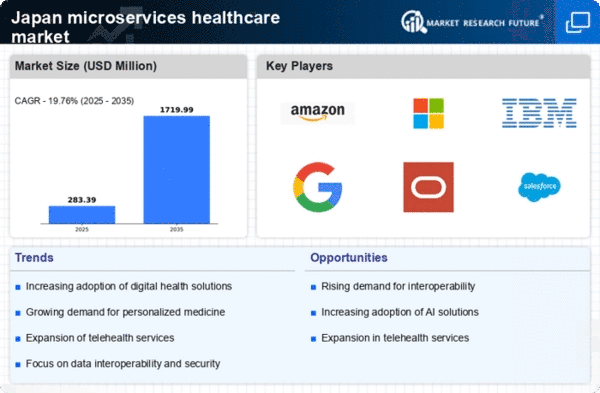Integration of Advanced Technologies
The integration of advanced technologies such as artificial intelligence (AI), machine learning (ML), and the Internet of Things (IoT) is significantly influencing the microservices healthcare market in Japan. These technologies enhance the capabilities of healthcare applications, allowing for improved patient monitoring, data analysis, and decision-making processes. For instance, AI-driven tools can analyze vast amounts of patient data to identify trends and predict health outcomes, thereby optimizing treatment plans. The market for AI in healthcare is expected to reach $2 billion by 2026 in Japan, reflecting the growing reliance on technology to improve healthcare delivery. As healthcare providers increasingly adopt these technologies, the microservices healthcare market is poised for substantial growth, driven by the demand for innovative solutions that enhance operational efficiency and patient care.
Shift Towards Value-Based Care Models
The shift towards value-based care models is significantly impacting the microservices healthcare market in Japan. Healthcare providers are increasingly moving away from traditional fee-for-service models to focus on delivering high-quality care that improves patient outcomes. This transition necessitates the adoption of flexible and scalable microservices architectures that can support the integration of various healthcare services and data sources. By leveraging microservices, organizations can develop applications that facilitate care coordination, patient engagement, and outcome measurement. The value-based care market is projected to grow at a CAGR of 20% in Japan, indicating a strong demand for innovative solutions that align with this new approach to healthcare delivery. As a result, the microservices healthcare market is likely to expand in response to this evolving landscape.
Growing Focus on Data Security and Compliance
Data security and compliance are becoming paramount concerns within the microservices healthcare market in Japan. With the increasing digitization of healthcare data, organizations are prioritizing the implementation of robust security measures to protect sensitive patient information. The introduction of stringent regulations, such as the Act on the Protection of Personal Information, necessitates that healthcare providers adopt secure microservices architectures that ensure data integrity and confidentiality. This focus on security is likely to drive investments in advanced cybersecurity solutions, further propelling the growth of the microservices healthcare market. As organizations strive to meet compliance requirements, the demand for secure and reliable healthcare applications is expected to rise.
Regulatory Support for Digital Health Initiatives
Regulatory support for digital health initiatives is emerging as a crucial driver for the microservices healthcare market in Japan. The government has been actively promoting the adoption of digital health technologies to improve healthcare access and efficiency. Initiatives such as the 'Health and Medical Strategy' aim to foster innovation in healthcare delivery through the use of digital solutions. This regulatory environment encourages healthcare organizations to invest in microservices architecture, which facilitates the development of scalable and flexible applications. As a result, the microservices healthcare market is likely to benefit from increased funding and support for digital health projects, leading to enhanced healthcare services and improved patient outcomes.
Rising Demand for Personalized Healthcare Solutions
the microservices healthcare market in Japan is shifting towards personalized healthcare solutions. This trend is driven by an increasing awareness among patients regarding their health needs and preferences. As healthcare providers seek to enhance patient engagement, microservices architecture allows for the development of tailored applications that cater to individual patient requirements. The market is projected to grow at a CAGR of approximately 15% over the next five years, indicating a robust demand for customized healthcare services. This growth is further supported by advancements in data analytics and artificial intelligence, which enable healthcare providers to offer more precise and effective treatment plans. Consequently, the microservices healthcare market is expected to expand as organizations invest in technologies that facilitate personalized care.
















